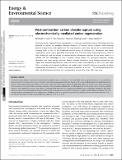Post-combustion carbon dioxide capture using electrochemically mediated amine regeneration
Author(s)
Stern, Michael C.; Simeon, Fritz; Herzog, Howard J.; Hatton, Trevor Alan
DownloadHatton_Post-combustion carbon.pdf (1.083Mb)
PUBLISHER_CC
Publisher with Creative Commons License
Creative Commons Attribution
Terms of use
Metadata
Show full item recordAbstract
Electrochemically mediated amine regeneration is a new post-combustion capture technology with the potential to exploit the excellent removal efficiencies of thermal amine scrubbers while reducing parasitic energy losses and capital costs. The improvements result from the use of an electrochemical stripping cycle, in lieu of the traditional thermal swing, to facilitate CO[subscript 2] desorption and amine regeneration; metal cations generated at an anode react with the amines, displacing the CO[subscript 2], which is then flashed off, and the amines are regenerated by subsequent reduction of the metal cations in a cathode cell. The advantages of such a process include higher CO[subscript 2] desorption pressures, smaller absorbers, and lower energy demands. Several example chemistries using different polyamines and copper are presented. Experimental results indicate an open-circuit efficiency of 54% (15 kJ per mole CO[subscript 2]) is achievable at the tested conditions and models predict that 69% efficiency is possible at higher temperatures and pressures. A bench scale system produced 1.6 mL min[superscript −1] CO[subscript 2] while operating at 0.4 volts and 42% Faradaic efficiency; this corresponds to a work of less than 100 kJ per mole.
Date issued
2013-06Department
Massachusetts Institute of Technology. Department of Chemical Engineering; MIT Energy InitiativeJournal
Energy & Environmental Science
Publisher
Royal Society of Chemistry
Citation
Stern, Michael C., Fritz Simeon, Howard Herzog, and T. Alan Hatton. “Post-Combustion Carbon Dioxide Capture Using Electrochemically Mediated Amine Regeneration.” Energy & Environmental Science 6, no. 8 (2013): 2505. © Royal Society of Chemistry
Version: Final published version
ISSN
1754-5692
1754-5706